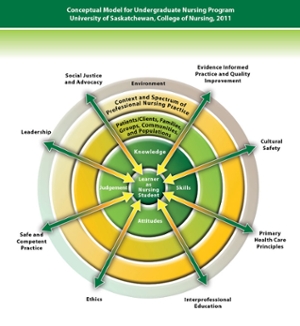Interprofessional Education

Organization
The College of Nursing’s commitment to interprofessional education (IPE) has been expressed since the beginning of the new Bachelor of Science in Nursing (BSN) program, which was introduced in 2011. A variety of innovative experiences throughout the BSN program expose and immerse students in the essential knowledge, skills and attitudes required to become effective members of interprofessional teams. As the curriculum continues to evolve, the College of Nursing will continue to create new interprofessional learning opportunities that are innovative and responsive to the environment in which we educate our students.
The College of Nursing operationalizes a commitment to interprofessional education, including interprofessional and intersectoral relationships. This commitment includes the participation in IPE activities by administration (College and University), faculty, staff and students.
As a college committed to improved quality care, IPE has been identified as one of the eight principles underlying the undergraduate curriculum incorporating participation and respect for contributions of the patient, family and additional health care providers.
“Collaborative practice has been found to have a positive impact on patient safety, quality of care, length of hospital stays and staff recruitment and retention,” said Associate Dean Dr. Hope Bilinski. “Upon completion of their programs, our health sciences students will be expected to practice as effective members of interprofessional teams and will thus be contributing to collaborative practice environments. With seven health sciences colleges at the University of Saskatchewan, we are in a unique position to provide innovative interprofessional experiences for our students as they progress through their education. The College of Nursing is committed to building on our previous successes in IPE and working with our health sciences colleagues in creating new learning opportunities for our students.”
Not only are staff and faculty committed to providing students with an interprofessional education, the students themselves see value in collaborating with students from other health science colleges, as evident in the following quotes.
“I enjoyed interprofessional educational opportunities because they give each field more respect for each other. They give us the chance to become familiar and appreciate what each profession can bring to the table.”
“The best care can be provided for the patient when we all work together.”
“The more we know about each other’s roles, the better and more seamless the care will be for the patient.”
“Many aspects of our profession keep us separated/isolated from other professions; however, a multidisciplinary approach is always best, as each profession picks up on other things and the patient may never reach full potential until all aspects of care have been covered.”
Initiatives
The College of Nursing has taken a multifactorial approach to integrating interprofessional education within the undergraduate curriculum. This approach includes the integration of theory into the undergrad curriculum, professional development for faculty and clinical instructors and drawing on the knowledge of experts in the fields of interprofessional education and collaborative practice. Doing so, will enable our nursing graduates to have the beginning knowledge, skills and behaviours for collaborative practice.
The timeline for the integration of IPE in the College of Nursing is highlighted in the diagram below.


